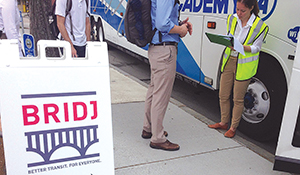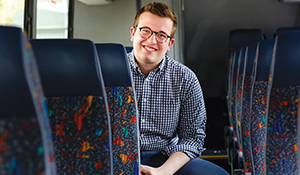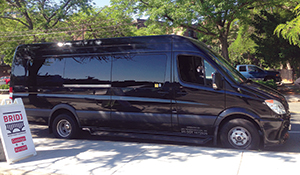
Boston-area commuters get a taste of a new way to get across town
By David Hubbard
—————————————————————————————————————————————
YOU MIGHT ALSO LIKE:
- FMCSA announces enhancements to SMS website
- COTA plans for future
- NTI praises Dallas, Denver and Los Angeles’ MAX program
—————————————————————————————————————————————

Still in beta testing and having just launched service in the Boston area in June, Bridj bills itself as a “smart, living, breathing, thinking transportation system” that elevates the typical commute to high-end direct bus service.
The startup company is building from a complex business strategy using machine-learning algorithms to gather predictive data on movement within the city. It then creates dynamic transportation routes to match direct service with the most popular pick-up and drop-off locations; adding bus routes where they are needed most, starting with nonstop routes in Boston, Brookline and Cambridge.
Bridj has operated in partnership with Academy Bus Lines, Braintree, MA, a 40-year old bus and coach operator serving the Northeast and the largest privately operated transportation company in the nation, Academy Bus Lines, along with other smaller transportation providers.
These carriers are responsible for providing the buses and licensed and registered drivers to Bridj. The service is so new, in fact, that the Bridj buses still bear the branding of their partners. Ultimately they will be totally rebranded with trademark colors and its own corporate identity.

Bridj the gap
The company says this system intends to fill the gap between MBTA service and technology-driven car firms such as Uber. Bridj smart route planning offers customers direct service in a guaranteed leather seat and access to Wi-Fi.
Bridj is the brainchild of 24-year-old Matthew George, a Middlebury College graduate majoring in biology, who cut his teeth in the bus industry building a college bus company in his dorm room. As student government transportation director at Middlebury College, he used his data skills to figure out more efficient bus routes for students headed home on school vacations. This exercise became BreakShuttle, which now serves nearly 40 schools and generates $1 million a year in revenue.
His resume to-date also includes work as an emergency medical technician and a stint as a White House intern working with trend-predicting data.
George says by harnessing vast amounts of online data that show where people live, work, and play, his company can predict and areas of peak demand on any given day and adjust its schedules accordingly. Bridj runs on a program George created using uses algorithms, Google Earth, and geographic information systems software to help move people from one place to another. BreakShuttle, while operating at Auburn University, has moved thousands of students to within 20 miles of their hometowns using just four routes.
“Bridj reaches beyond funneling people into traditional modes of public transit,” George says. “We match up private transportation with people, from where they are to precisely where they want to go.”

The company determines routes from algorithms and data supplied by riders, like where they live and where they work, and will continue to invite everyone’s input via crowdsourcing techniques. George says popular destinations and events such as Red Sox games will also factor into where and when Bridj will offer service. Riders sign up online and the company collects their home and work ZIP codes, eventually drilling down to specific streets. It also scours the internet for Foursquare check-ins, tweets and Facebook updates to gauge travel patterns and factors in significant sports and cultural events. A software program crunches the real-time data to anticipate what routes need to add, and where to use smaller shuttles to serve less popular destinations. Bridj is already experimenting with 13 passenger Sprinter vans.
“Boston was the first city to put a subway system in the city,” George says. “Now it’s going to be really cool because this city is going to be the first in the entire world to have a pop-up transit system.”
He says interest in the service is high. Earlier in the year, George advertised on Facebook looking for 350 people to try Bridj. Within 24 hours, he received more than 1,000 responses and quickly totaled 3,200.
“We believe that we are filling an unmet need,” George says. “Bridj exists and thrives in the middle ground between public transit and highly personalized private options. The average price of a Bridj trip is around $5, which is a bit more expensive than public transit but less expensive than taking a taxi.”
George considers Bridj a relief valve for the MBTA, not a competitor. He hopes to eventually reduce prices to $3-to-$4 per ride for short trips — not far off from the $2 to $2.50 cost of a single-ride T fare.
A Bridj so far out
In no way content to stop here with a semi-traditional bus service, George is thinking about something on a grander scale.
“By reinventing the way the world travels, we can use any form of transportation,” he says. “To match where people are with where they need to go, we should be able to mix and match vehicles from small — maybe driverless — vans to large buses and coaches, charter planes and perhaps even space ships.”
George says transportation has undergone a tremendous paradigm shift in line with advances in technology over the past several years. Seeing Bridj on that cusp, the company will announce later this month its secured funding in the seven-digit range from private investors to take the next step toward “a living, breathing, learning, smart mass transit system operating in multiple cities around the globe.”
